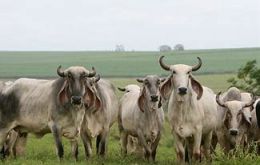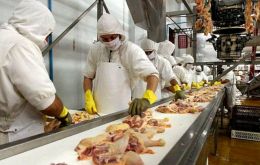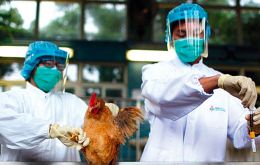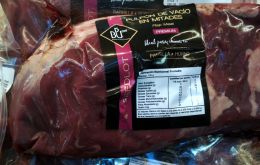MercoPress. South Atlantic News Agency
Agriculture
-
Wednesday, February 15th 2023 - 09:29 UTC
Brazil planning beef exports of three million tons by 2030

Brazil ended 2022 as the largest exporter of beef in the world, according to the Brazilian Association of Meat Exporters (Abisec). In effect, Abisec data showed Brazilian beef exports rose 40,8% rose between January and December 2022 compared to the same period in 2021
-
Monday, February 13th 2023 - 14:41 UTC
Significant drop in prices China is prepared to pay for beef

China purchased much more beef in January than in the same month of 2022, but paid much less. In effect during most of the second half of 2022, China was prepared to pay up to US$ 6,200a ton of prime beef protein, but since last month it dropped drastically to US$ 4,800 the ton, forcing a renegotiation of volumes and having an impact on the overall industry.
-
Saturday, February 11th 2023 - 15:48 UTC
Brazil, free of avian flu, so far, exported a record 421.000 tons of poultry meat in January

With poultry prices soaring (a dozen of eggs in California reached eight dollars, yes eight dollars and climbing) because of the intense culling of millions of chickens caused by the avian flu, no wonder then than poultry meat exports from Brazil during January reached 420.900 tons, up 20.6% compared to the same period of the previous year and a record for the month, claimed the ABPA (Brazilian Association of Animal Protein) this week.
-
Thursday, February 9th 2023 - 10:26 UTC
Argentina agro-industry exports expected to drop some 28% this year because of the drought

Argentine agro-industrial exports are expected to climb to some US$ 47 billion this year, which is 28% less than in 2022 mainly because of the drought and lack of rains punishing most of the country's territory. The report is from the Argentine Agriculture for Development Foundation, FADA, based on lesser export estimates of grains, beef, and dairy produce.
-
Tuesday, February 7th 2023 - 10:22 UTC
Emergency in Brazil as avian flu outbreak reported in neighboring Bolivia; poultry exports total US$ 9,7billion

After two decades, the highly pathogenic (when almost all infected animals show symptoms of the disease) avian flu has become a real threat to Brazilian flocks and production. Nine countries in Central and South America have confirmed 75 outbreaks of the disease in recent months and have already had to sacrifice 1.2 million birds.
-
Thursday, February 2nd 2023 - 23:54 UTC
Uruguay: Drought losses estimated at USD 1.200 million, Minister says

Uruguay’s Minister of Livestock, Agriculture, and Fishing, Fernando Mattos, appeared before the Permanent Commission of Parliament at the request of the opposition Frente Amplio (Broad Front) to explain the measures taken by the government in response to the drought that has affected the country since last year.
-
Thursday, February 2nd 2023 - 10:59 UTC
Uruguay cattle breeders fear 'monopoly conditions' as Brazilian companies control most of the beef industry

Brazil's protein producer giant Minerva Foods issued a note to the market communicating the purchase of state-of-the-art Breeders and Packers Uruguay (BPU Meat) abattoir and processing plant for USD 40 million. The conclusion of the deal is still pending approval by the Uruguayan authorities.
-
Thursday, February 2nd 2023 - 10:15 UTC
Southern Brazil pork and poultry farmers concerned with Chinese demand for “overpriced” corn

Expectations of large Brazilian corn exports to China in 2023 are worrying Brazil’s meat companies, according to a statement from Santa Catarina’s meat processors lobby Sindicarne this week. The group said competition from Chinese buyers is already reducing local supplies and making corn used to feed poultry and pork an “overpriced” commodity.
-
Tuesday, January 24th 2023 - 08:38 UTC
Brazil ratifies in Germany its commitment to sustainable agriculture and respect for the environment

The Brazilian Minister of Agriculture, Carlos Fávaro, arrived iis in Berlin to participate in the Global Forum for Food and Agriculture (GFFA). In his first official trip abroad as the head of the ministry, he intends to launch a concerted effort to change the image of Brazilian agribusiness and restore ties with important importers, mainly from Europe.
-
Saturday, January 21st 2023 - 10:18 UTC
Brazilian 2022 agribusiness exports totaled US$ 160bn, up 32% from previous year

Brazilian agribusiness exports totaled almost US$ 160 billion in 2022, up 32% over the previous year, influenced by the performance of international prices, according to the Secretariat of Trade and International Relations (SCRI) from the Ministry of Agriculture and Livestock